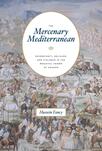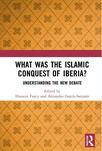Hussein Fancy
Associate Professor of History; Associate DGS, History
Office:
HQ 202
Phone:
203-432-3933
Fields of interest:
Medieval European and Islamic History; Medieval Iberia and North Africa; Social History; Intellectual History; Economic History; Legal History; Latin and Arabic Paleography
Bio:
Hussein Fancy is a historian of medieval Europe and the Islamic world. His research and writing focus on the economic, social, legal, and intellectual history of interaction between Jews, Christians, and Muslims in the medieval Mediterranean. In particular, he pursues projects that combine Latin, Arabic, and Romance archival sources.
Fancy’s first book, The Mercenary Mediterranean, examined the service of Muslim soldiers from North Africa to the Christian kings of the Crown of Aragon in the thirteenth and fourteenth centuries. Far from marking the triumph of toleration, he argued, the alliance of Christian kings and Muslim soldiers depended on and reproduced ideas of religious difference. The Mercenary Mediterranean received the Herbert Baxter Adams Prize from the American Historical Association for the best first book in European history, the L. Carl Brown Prize from the American Institute of Maghreb Studies for the best book in North African studies, and the Jans F. Verbruggen Prize from De Re Militari for the best book in medieval military history. Most recently, along with Alejandro García-Sanjuán, he edited What Was the Islamic Conquest of Iberia?, a collection that examined the on-going scholarly controversies surrounding the Islamic conquest of the Iberian Peninsula in 711.
He is currently working on two projects. The first, entitled The Impostor Sea: The Making of the Medieval Mediterranean, follows the activities of criminal merchants—pirates and smugglers—to rethink the relationship between religion and trade. Rather than “enemies of all,” this book argues that these figures were central to the making of new legal, religious, and racial boundaries in the late medieval Mediterranean. The second, entitled The Eastern Question, examines western views of Islam from the seventh century to the present, arguing that both positive and negative images of Islam across history share the same polemical genealogy.
Fancy received his B.A. in English from Yale University and a Ph.D. in History from Princeton University, where he studied with William Chester Jordan and Michael Cook. Before coming to Yale, he taught at the University of Michigan for eleven years. Fancy was a Junior Fellow of the Michigan Society of Fellows, a Carnegie Scholar, an ACLS Fellow, and a Rome Prize Fellow of the American Academy in Rome. He has served as a Councillor of the Medieval Academy of America and as a board member of the American Institute of Maghreb Studies and the Spain and North Africa Project. He has also lived and worked extensively in Spain, Italy, France, and across North Africa.
Professor Fancy welcomes inquiries from prospective graduate students interested in any aspect of Medieval European and/or Islamic History, particularly comparative study.
Selected Publications:
The Mercenary Mediterranean: Sovereignty, Religion, and Violence in the Medieval Crown of Aragon (University of Chicago Press, 2016; 2nd ed. 2018) *Winner of the Herbert Baxter Adams Prize, the L. Carl Brown Prize, and the Jans F. Verbruggen Prize.*
What was the Islamic Conquest of Iberia? Understanding the Debate, ed. with Alejandro García Sanjuán (New York: Routledge, 2021)
“Provincializing the Mediterranean” in “On Transnational and International History,” The American Historical Review, 128, no. 1 (2023): 255-332.
“Color, Race, and Religion in the Cantigas de Santa Maria” in Balthazar: A Black African King in Medieval and Renaissance Art, eds. Kristen Collins and Bryan Keene (Los Angeles: Getty Publications, 2023), 42-47.
with M. Cooperson, M. Karnes, et. al., “Fictionalities in medieval Arabic texts: A roundtable,” Postmedieval 13 (2022): 577-592.
“Convivencia and Crisis,” History and Anthropology 32, no. 5 (2021): 647-51.
“Captivity, Ransom, and Manumission” in The Cambridge World History of Slavery: AD 500 - AD 1420, eds. David Richardson, Stanley Engerman, David Eltis and Craig Perry, vol. 2 (Cambridge University Press, 2021), 53-76.
“The New Convivencia,” Journal of Medieval Iberian Studies, 11, no. 3 (2019): 295-305.
“Muslim Crusaders: Guzmán el Bueno and the Limits of Secular History,” in “Voices of Conflict and Cultural Difference in the Medieval Mediterranean,” ed. Michael Lower and Uri Shachar, a themed issue of al-Masaq 30, no. 3 (2018): 248-265.
“Of Sovereigns, Sacred Kings, and Polemics,” History and Theory 36, no. 1 (2017): 61-70.
“Monarchs and Minorities: ‘Infidel’ Soldiers in Mediterranean Courts,” in The Globalization of Knowledge in the Post-Antique Mediterranean, ed. Jürgen Renn and Sonja Brentjes (Routledge, 2016).
“Theologies of Violence: The Recruitment of Muslim Soldiers by the Crown of Aragon,” in Past & Present 221, no. 1 (Nov. 2013) *Winner of the Bishko Prize for best article published in the field of medieval Iberian history.*
“The Last Almohads: Universal Sovereignty between North Africa and the Crown of Aragon,” in Medieval Encounters 19:1-2 (2013). [Reprinted in Spanning the Strait: Studies in Unity in the Western Mediterranean, ed. Yuen-Gen Liang, Abigail Krasner Balbale, Andrew Devereux, and Camillo Gómez-Rivas (Brill, 2013).
“The Intimacy of Exception: The Diagnosis of Samuel Abenmenassé,” in Center and Periphery: Studies on Power in the Medieval World in Honor of William Chester Jordan, ed. Katherine L. Jansen, G. Geltner, and Anne E. Lester (Brill, 2013).
Period:
Medieval
Geography:
Africa
Global/International
Mediterranean
Middle East


